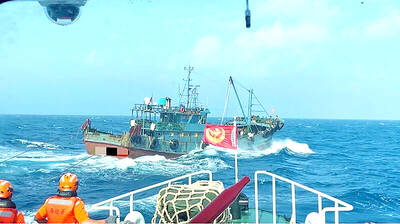Singapore's iconic 117-year-old Raffles Hotel has been sold, along with 40 other hotels and properties worldwide to US-based investment fund Colony Capital LLC for S$1.72 billion (US$1 billion), including debt, former parent Raffles Holdings Ltd said yesterday.
The deal includes all 41 hotels and resorts around the world marketed under the Raffles and Swissotel brand names.
Its most prominent establishment is the luxurious 103-suite Raffles Hotel in Singapore, built in 1887.
The hotel's colonial-style architecture houses a tropical garden courtyard, museum and Victorian-style theater.
The hotel is an official national monument named after the city state's modern founder, Sir Stamford Raffles, and is a known source of inspiration for writers W. Somerset Maugham, Joseph Conrad and Rudyard Kipling.
It has also played host to hundreds of celebrities ranging from Michael Jackson to Charlie Chaplin.
Colony Capital, which specializes in owning hotels and other hospitality assets, said it will retain the Raffles and Swissotel brands and plans to expand the chains, particularly in the Asia-Pacific region.
"We deeply respect the historical significance of the Raffles Hotel Singapore and we consider it our responsibility to protect that legacy," Colony chief executive Thomas Barrack said.
CapitaLand Ltd, Southeast Asia's largest property developer that owns 59.7 percent of Raffles Holdings, said in a statement yesterday that it will gain S$605 million from the sale and plans to pay shareholders a special dividend of S$0.40 a share.
The cash price for the hotels is S$1.45 billion.
Colony Capital, a private investment firm based in Los Angeles, also owns a number of US casinos, including the Las Vegas Hilton and Resorts International in Atlantic City.
The transaction is subject to approval by shareholders. CapitaLand has said it will vote in favor of the sale, Raffles said.
Explaining the reason for the sale, Raffles Chief Executive Jennie Chua said the hotel business lacked scale, ranking 17th or 18th in the world in terms of market capitalization and number of rooms.
To grow, the hotel business would need significant investments and potential cash calls and "that's something we would not like to do," she said at a press conference.
Following the sale, Raffles' only non-cash asset will be its 45 percent stake in Tincel, which owns the Raffles City Complex in Singapore.

POLITICAL AGENDA: Beijing’s cross-strait Mid-Autumn Festival events are part of a ‘cultural united front’ aimed at promoting unification with Taiwan, academics said Local authorities in China have been inviting Taiwanese to participate in cross-strait Mid-Autumn Festival celebrations centered around ideals of “family and nation,” a move Taiwanese academics said politicizes the holiday to promote the idea of “one family” across the Taiwan Strait. Sources said that China’s Fujian Provincial Government is organizing about 20 cross-strait-themed events in cities including Quanzhou, Nanping, Sanming and Zhangzhou. In Zhangzhou, a festival scheduled for Wednesday is to showcase Minnan-language songs and budaixi (布袋戲) glove puppetry to highlight cultural similarities between Taiwan and the region. Elsewhere, Jiangsu Province is hosting more than 10 similar celebrations in Taizhou, Changzhou, Suzhou,

The Republic of China (ROC) is celebrating its 114th Double Ten National Day today, featuring military parades and a variety of performances and speeches in front of the Presidential Office in Taipei. The Taiwan Taiko Association opened the celebrations with a 100-drummer performance, including young percussionists. As per tradition, an air force Mirage 2000 fighter jet flew over the Presidential Office as a part of the performance. The Honor Guards of the ROC and its marching band also heralded in a military parade. Students from Taichung's Shin Min High School then followed with a colorful performance using floral imagery to represent Taiwan's alternate name

COGNITIVE WARFARE: Chinese fishing boats transmitting fake identification signals are meant to test Taiwan’s responses to different kinds of perceived incursions, a report said Chinese vessels are transmitting fake signals in Taiwan’s waters as a form of cognitive warfare, testing Taipei’s responses to various types of incursions, a report by the Institute for the Study of War said on Friday. Several Chinese fishing vessels transmitted fake automatic identification system (AIS) signals in Taiwan’s waters last month, with one mimicking a Russian warship and another impersonating a Chinese law enforcement vessel, the report said. Citing data from Starboard Maritime Intelligence, the report said that throughout August and last month, the Chinese fishing boat Minshiyu 06718 (閩獅漁06718) sailed through the Taiwan Strait while intermittently transmitting its own AIS

CHINESE INFILTRATION: Medical logistics is a lifeline during wartime and the reported CCP links of a major logistics company present a national security threat, an expert said The government would bolster its security check system to prevent China from infiltrating the nation’s medical cold chain, a national security official said yesterday. The official, who wished to stay anonymous, made the remarks after the Chinese-language magazine Mirror Media (鏡周刊) reported that Pharma Logistics (嘉里醫藥物流) is in charge of the medical logistics of about half of the nation’s major hospitals, including National Taiwan University Hospital and Taipei Veterans General Hospital. The company’s parent, Kerry TJ Logistics Co (嘉里大榮物流), is associated with the National Committee of the Chinese People’s Political Consultative Conference (CPPCC) and the Chinese People’s Liberation Army (PLA), the